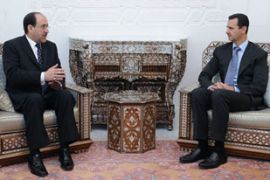Iraq and Syria pledge co-operation
Neighbours to work together amid concerns over foreign fighters crossing into Iraq.

Infiltration
Before the talks, both the Iraqi delegation and the US military had raised their concerns that armed groups launching attacks in northern Iraq were being reinforced by foreign fighters and weaponry brought over the border between the two countries.
|
“Iraq is still complaining about the infiltration of Arab and foreign terrorists into Iraq” Ali al-Moussawi, |
“Iraq is still complaining about the infiltration of Arab and foreign terrorists into Iraq,” Ali al-Moussawi, an adviser to al-Maliki, said.
While General Ray Odierno, the senior US commander in Iraq, said that although the “flow of foreign fighters in Iraq has decreased significantly … we’re still a little bit concerned with Syria’s role in this”.
But Thabet Salem, a journalist and political commentator in Damascus, told Al Jazeera that the Syrians had already done everything possible to stop foreign fighters crossing into Iraq.
“They have deployed 14,752 soldiers alongside the borders, 500 or more posts are observing the borders, while the Iraq have done absolutely nothing, along with the Americans, on their side of the borders,” he said.
“The Syrians will exploit the visit to tell Maliki ‘please stop doing these allegations, you have to do something, we have done what we can’.”
Maliki arrived a week after a US military delegation visiting Damascus reportedly discussed Iraqi security with Syrian officials, which Baghdad criticised for taking place without Iraqi representation.
Oil exports
Al-Maliki was accompanied on his visit by Hussein al-Shahristani, the Iraqi oil minister, and Latif Rashid, the water minister, as well as senior security officials.
Ali al-Dabbagh, the Iraqi government spokesman, told Iraqi state television from Damascus that Baghdad hopes to export its oil through Syrian pipelines.
“The oil ministry has a big and ambitious project to build pipelines to carry its oil products towards the Mediterranean via Syria,” he said.
Dabbagh also said that “the pipeline between Kirkuk and Baniyas will be repaired”.
During talks with Mailiki in Baghdad in April, Mohammed Naji Otri, the Syrian prime minister, agreed to repair the pipeline, which was shut off following the US-led invasion of Iraq in 2003.
Before March 2003, Syria received around 200,000 barrels of oil a day from Iraq at preferential prices, enabling it to profit from sales on the international market.
Water is also a major issue for the two neighbours, with Baghdad frequently complaining that the flow of the Euphrates river is not sufficent to meet Iraq’s agricultural needs.
In July, Baghdad called for talks with Ankara and Damascus over the issue.